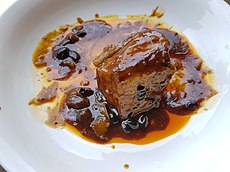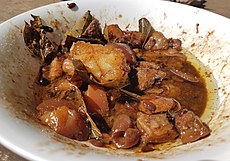Humbà, also spelled hombà, is a Filipino braised pork dish from Visayas, Philippines. It traditionally uses pork belly slow-cooked until very tender in soy sauce, vinegar, black peppercorns, garlic, bay leaves, and fermented black beans (tausi) sweetened with muscovado sugar. It also commonly includes hard-boiled eggs and banana blossoms.
  | |
| Alternative names | Hombà |
|---|---|
| Course | Main dish |
| Place of origin | Philippines |
| Region or state | Visayas |
| Serving temperature | Hot, warm |
| Main ingredients | Pork belly, soy sauce, garlic, vinegar, bay leaves, fermented black beans, black peppercorns, muscovado |
| Similar dishes | Philippine adobo, pata tim, hamonado |
Origin edit
Humba is derived from the Chinese red braised pork belly (Hokkien Chinese: 封肉; Pe̍h-ōe-jī: hong-bah / hong-mah; lit. 'roast meat'; also known in Mandarin Chinese: 紅燒肉; pinyin: hóngshāoròu; lit. 'red cooked meat') introduced to the Philippines via Hokkien immigrants, but it differs significantly from the original dish in that Filipino humba has evolved to be cooked closer to Philippine adobo, using a lot more vinegar. Humba also does not traditionally use rice wine, ginger, chilis, or five-spice powder; and it commonly use additional ingredients like banana flowers or pineapples, which are absent in the original dish. Regardless, traces of its Chinese origin is still evident in the primary use of fermented black beans (tausi), an uncommon ingredient in native Filipino cuisine. Humba is likely precolonial in origin and its precursor variant and ingredients were likely brought to the Visayas by Chinese traders from Hokkien.[1][2][3]
Description edit
The defining ingredient of humba is the fermented black beans (tausi), without which it is basically just a slightly sweeter Philippine adobo. Like adobo it has many different variants, but it is relatively easy to prepare albeit time-consuming.[4][5][6]
The most basic humba recipe uses fatty cuts of pork, usually the pork belly (liempo). It is marinated in a mixture of soy sauce, vinegar, garlic, bay leaves, and black peppercorns. The pork is then sautéed with the garlic. Once the meat is half-cooked and lightly browned, water is added with the rest of the ingredients along with fermented black beans and muscovado sugar (or some other sweetening agent). Banana blossoms may also be added. It is then allowed to simmer for a few hours until the meat is very tender. Alternatively, it can be cooked in a pressure cooker to cut down the cooking time. Hard-boiled eggs may be added before serving. It is eaten with white rice.[4][5][7][6]
Variants edit
Humba can sometimes be prepared with chicken, in which case it is more or less identical to Philippine chicken adobo, except for the use of tausi.[8] It can also be prepared with pineapples as the sweetener, which again makes it very similar to another Filipino dish, the hamonado.[7][9]
A similar dish to humba is pata tim, which is also derived from Chinese red braised pork belly. But pata tim does not use vinegar or tausi and primarily uses pork hock with péchay and mushrooms.[10]
Cultural significance edit
The Humba is known as the main delicacy of the town of Ronda in the province of Cebu. Every year, the town holds the Humba Festival to promote the local cuisine of the town. The festival is also considered a religious festival and is celebrated around the feast day of the town's patron saint, Our Lady of Sorrows, which falls on September 15. During the festival, there are Humba cooking contests and religious dance offerings in honor of the Blessed Virgin. This is generally a week long affair and all activities are aimed at promoting the Humba of Ronda. This festival is one of the activities of the tourism program done to promote the town of Ronda and the town's special Humba.[citation needed]
See also edit
References edit
- ^ "Recipe: Humba (Hong Ma or Chinese Soy Sauce Braised Pork)". The Big Fat White Guy. November 28, 2013. Retrieved January 9, 2019.
- ^ "Pork Humba Bisaya (Braised Pork Belly)". Russian Filipino Kitchen. July 25, 2014. Retrieved January 9, 2019.
- ^ "Humba: Pork Stewed in Vinegar, Garlic, Soy Sauce and Sugar". filipino-food-recipes.com. Retrieved January 9, 2019.
- ^ a b "Humba". Kawaling Pinoy. Retrieved January 9, 2019.
- ^ a b Agbanlog, Liza. "Humba (Filipino Braised Pork with Black Beans)". Salu Salo Recipes. Retrieved January 9, 2019.
- ^ a b "How to cook Humba with Sprite – Filipino Style Red Braised Pork Belly". Pursuit of a Functional Home. Retrieved January 9, 2019.
- ^ a b "Homba". Lutong Bisaya. May 4, 2010. Retrieved January 9, 2019.
- ^ Sarthou, Myke. "Chicken Humba Recipe". Yummy.ph. Retrieved January 9, 2019.
- ^ "Homba". Lifestyle.com.au. Retrieved January 9, 2019.
- ^ "Pata Tim (Braised Pork Hocks)". Panlasang Pinoy Meaty Recipes. Retrieved January 10, 2019.
External links edit
- Media related to Humba at Wikimedia Commons